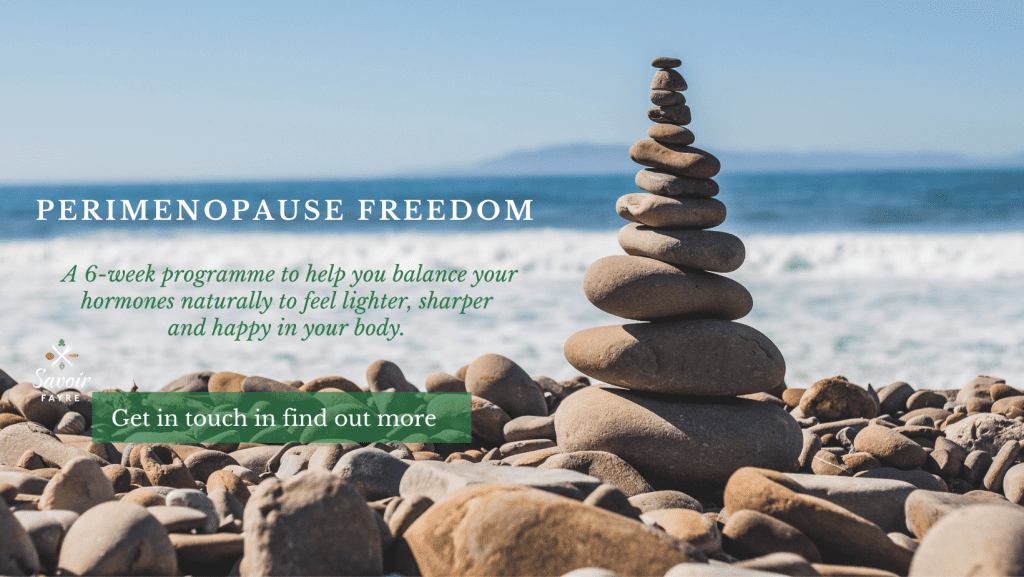
PMS or Peri – what are the signs of Perimenopause?
What is Perimenopause
It is a natural phase in a woman’s life and spotting the first signs of Perimenopause can truly help you stay in tune with your body. Perhaps we hear more about Menopause but the years before stepping officially into Menopause are crucial.
This is a time when you can be proactive in supporting your hormones before the appearance of the symptoms.
So let’s discover the signs of Perimenopause and how to prepare for it.
3 Phases in a woman’s life
There are 3 phases in a woman’s life: premenopause, perimenopause, menopause also called postmenopause. My focus today is to help you establish whether you may be experiencing premenopause symptoms (PMS) or perimenopause symptoms. Once you understand your body fully, you can then explore natural therapies to help you feel better. The sooner you address symptoms of premenopause and perimenopause, the smoother the transition into menopause.
Premenopause – what is it?
The period before menopause is called premenopause, from your very first menstrual cycle to the first sign of perimenopause. Women experience a fluctuation in hormones through their life with different symptoms. Here are the possible symptoms of premenopause or PMS:
- Abdominal cramps
- Mood swings
- Nausea
- Irritability/anxiety
- Low mood
- Bloating / IBS symptoms
- Breast tenderness
At what age does Perimenopause start?
You can start noticing the signs of Perimenopause from mid to late 30’s and can last between 3 to 10 years.
Yes, it may sound like an early start but some women can experience hormone imbalance throughout their live from puberty right through to Menopause.
During perimenopause, the ovaries start to reduce the production of oestrogen. Ovaries will stop releasing eggs and a woman will stop having periods. A woman can be in perimenopause and still get pregnant.
When perimenopause hits, you may just experience one or two symptoms but you will probably still have your periods (albeit irregular). Doctors’ tests may even show you that everything is normal. At this stage, it can be difficult to link those symptoms to perimenopause. But it is always worth investigating so you can do something about it. The symptoms will become more obvious as you approach menopause.
What are the signs of Perimenopause?
Every women is different due to their background, health history, genetics and individual lifestyle. For some, one symptom will show up and it is difficult to link it to perimenopause. Hormones fluctuate every month so you may be feeling more than one symptoms to start with. Here is a list of signs and symptoms women have experienced when approaching perimenopause:
- Poor memory and foggy brain
- Poor sleep
- Mood swings
- Irregular periods
- Hot Flashes / Night Sweats
- Anxiety
- Tender breasts
- Vaginal dryness / infection
- Dry skin
- Loss of libido
- Persistent bloating
- IBS symptoms
- Weight gain
What happens during Menopause?
Menopause is the stage in a woman’s life when her periods have stopped for a whole year.
The years leading up to that point are called perimenopausal years. If you have a total hysterectomy that involves removing your ovaries, you’ll experience the menopause immediately after your operation.
During menopause, the ovaries stop making female hormones, including oestrogen. The adrenal glands are able to produce a small amount of oestrogen. But any presence of stress can deplete the adrenal glands and inhibit their ability to produce oestrogen. This can aggravate the menopausal symptoms. The symptoms experienced during perimenopause may carry on into menopause.
What you really need to know today
Some women may experience symptoms before (perimenopause), during (for a year or two) and after menopause. Others stop experiencing symptoms once they are postmenopausal. Those symptoms vary from one person to the next and can be extremely intense. This is likely to have a huge impact on your daily life including your relationships with your work colleagues and family members. It is highly recommended to prepare yourself by being proactive as soon as you can (ideally in your 30’s) so that you are not taken by surprise. Let’s not keep it a secret.
Every woman goes through this stage in their life. It is normal and not only should we talk about it, but we should also prepare for it.
What to do about Perimenopause
Once you have noticed the first signs of perimenopause, the first step to explore is Nutrition. Indeed, the right nutrition can play a big role in this journey to hormone balance. There are several steps you can try to help prevent or decrease the symptoms associated with Perimenopause.
- Eat the rainbow to provide your body with lots of valuable nutrients
- Eat regularly to balance your energy levels.
- Address any stress in your life to support your adrenal glands. Adrenal fatigue can cause hormone imbalance
- Work on improving your digestion – the balance of bacteria in your gut plays a key role in hormone balance. Download your free guide “5 steps to reduce bloating after eating.”
- Keep things moving with hydration and plenty of fibre rich foods.
Perimenopause – would you like to feel in control?
If you wish to understand your body fully and start taking actions to make you feel good, take a look at the Perimenopause Freedom Programme. This nutrition coaching programme is not just designed to troubleshoot individual symptoms, instead, it takes a full 360° view of your health, considering the body as a dynamic set of interconnected systems that all have the potential to influence each other. So as well as focusing on your hormones, you will also learn how to achieve optimum health.

If you are wondering whether this programme is for you, feel free to get in touch for a chat.
